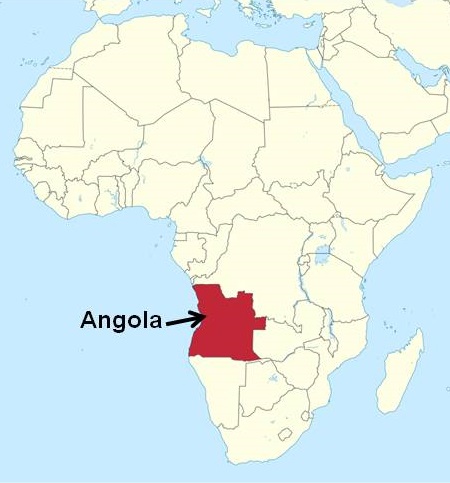Cholera Cases on the Rise in Angola
By Adebowale Bello. B.Tech Microbiology, Freelance Health Writer. Medically reviewed by the DLHA Team.
 Since January 2025, Angola has been struggling with a severe cholera outbreak that has spread quickly across the country. As of March 23, over 8,500 cases and 329 deaths have been reported. This means that for every 100 people who catch cholera, about 4 of them don’t survive and this is much higher than what is typically expected during cholera outbreaks.
Since January 2025, Angola has been struggling with a severe cholera outbreak that has spread quickly across the country. As of March 23, over 8,500 cases and 329 deaths have been reported. This means that for every 100 people who catch cholera, about 4 of them don’t survive and this is much higher than what is typically expected during cholera outbreaks.
Even more alarming is that about one-third of these deaths occurred outside health facilities, in the community, suggesting delays in seeking help and gaps in awareness and access to care.
For many Angolans, cholera is not a new disease. Yet, despite decades of battling this deadly infection, it continues to take lives, especially among young people and those in underserved communities.
The outbreak has reached 16 out of Angola’s 21 provinces. Luanda, the capital, and Bengo province are the hardest-hit, with nearly 80% of all cases coming from just these two areas.
The age group most affected is between 6 and 14 years old, followed closely by young adults aged 15 to 24. These are school-going children and young people who form the backbone of Angola’s future. Slightly more males have been affected than females.
Even more troubling is the high number of community deaths. This shows that people either don’t know what to do when symptoms appear or cannot reach health centres in time.
As the rainy season continues, the risk of the outbreak worsening is very high because rainwater often mixes with faeces and other waste, thereby contaminating water sources and making cholera even harder to control.
Cholera thrives in places where people have no clean water to drink, no proper toilets and poor hygiene practices. Unfortunately, many parts of Africa still struggle with these basic needs. This makes cholera not just a health problem but also a reflection of inequality and underdevelopment.
How Angola is Responding to the Cholera Outbreak
The Angolan Ministry of Health, with help from the World Health Organization (WHO), UNICEF and other partners, is leading a large-scale response. Over 120 health workers have been trained to detect and report new cases quickly. Rapid response teams have been deployed to affected communities, especially in Bengo, to help with detection, treatment and awareness.
Cholera treatment centres (CTCs) are being expanded to handle more patients. In January, a vaccination campaign reached over 900,000 people and another 700,000 vaccine doses arrived in mid-March for a second round. Although vaccines do not offer permanent protection, they help slow the spread during outbreaks.
On the preventive side, UNICEF is supplying hygiene kits to over 60,000 schoolchildren while helping communities access clean water by installing water tanks. Long-term improvements in water and sanitation infrastructure are also being prioritised.
This outbreak isn’t just Angola’s problem. With people frequently moving between Angola and its neighbours, the chances of the disease crossing borders are high. Already, 18 African countries have reported cholera cases this year, accounting for more than half of the global total. The situation in Angola is a warning that similar outbreaks could and does erupt elsewhere if preventive measures are not taken.
Moreover, the impact of climate change is worsening the problem. Floods and extreme weather events disrupt sanitation systems, force people into crowded shelters and expose communities to dirty water, all of which create the perfect conditions for cholera to spread.
To beat cholera, African governments must act swiftly and in coordination. The key steps include:
The cholera outbreak in Angola is a stark reminder that health crises in Africa often stem from deeper issues social and economic issues like poverty, lack of infrastructure and limited health services.
For too long, these issues have gone unaddressed and it's time for policymakers, community leaders and health advocates across the continent to prioritise water, sanitation and hygiene. These are not luxuries, they are lifesaving necessities.
Cholera is a diarrhoeal disease caused by consuming food or water contaminated with a germ (bacterium) called Vibrio cholerae. It spreads rapidly in places with poor sanitation and limited access to clean water. The infection causes sudden, watery diarrhoea that can lead to severe dehydration and death if not treated quickly.
Although most people with cholera do not show symptoms, they can still spread the germ through their stool (faeces). Those who do fall sick may experience mild to severe diarrhoea and vomiting, making them extremely dehydrated in a short time.
Thankfully, cholera is highly treatable using oral rehydration salts (ORS) and, in severe cases, intravenous fluids and antibiotics.
Source: World Health Organization Newsroom
Related:
Cholera in the African setting
General epidemiology of cholera
Published: April 20, 2025
© 2025. Datelinehealth Africa Inc. All rights reserved.
Permission is given to copy, use and share content for non-commercial purposes without alteration or modification and subject to source attribution.
DATELINEHEALTH AFRICA INC., is a digital publisher for informational and educational purposes and does not offer personal medical care and advice. If you have a medical problem needing routine or emergency attention, call your doctor or local emergency services immediately, or visit the nearest emergency room or the nearest hospital. You should consult your professional healthcare provider before starting any nutrition, diet, exercise, fitness, medical or wellness program mentioned or referenced in the DatelinehealthAfrica website. Click here for more disclaimer notice.